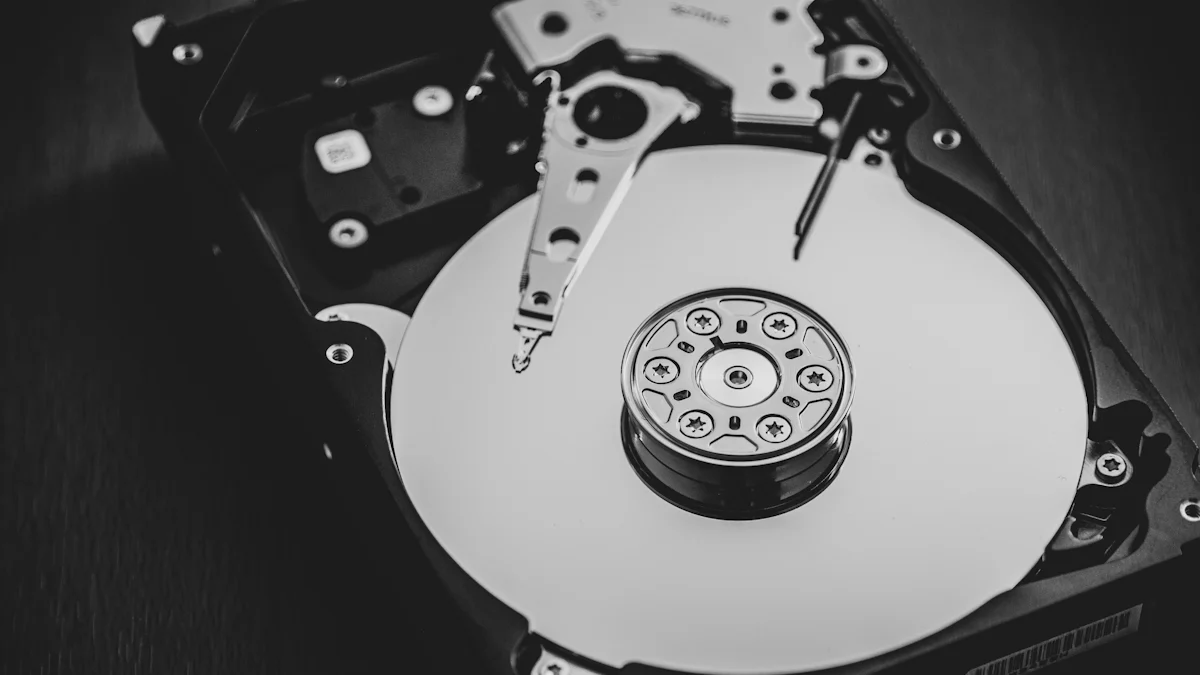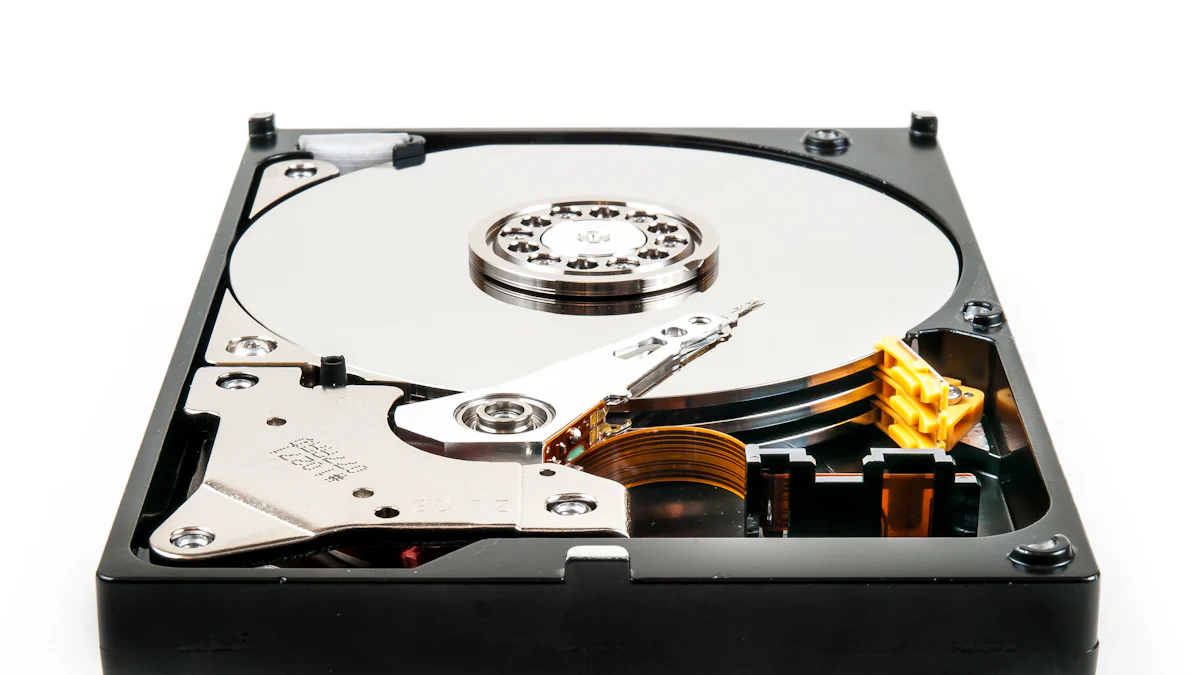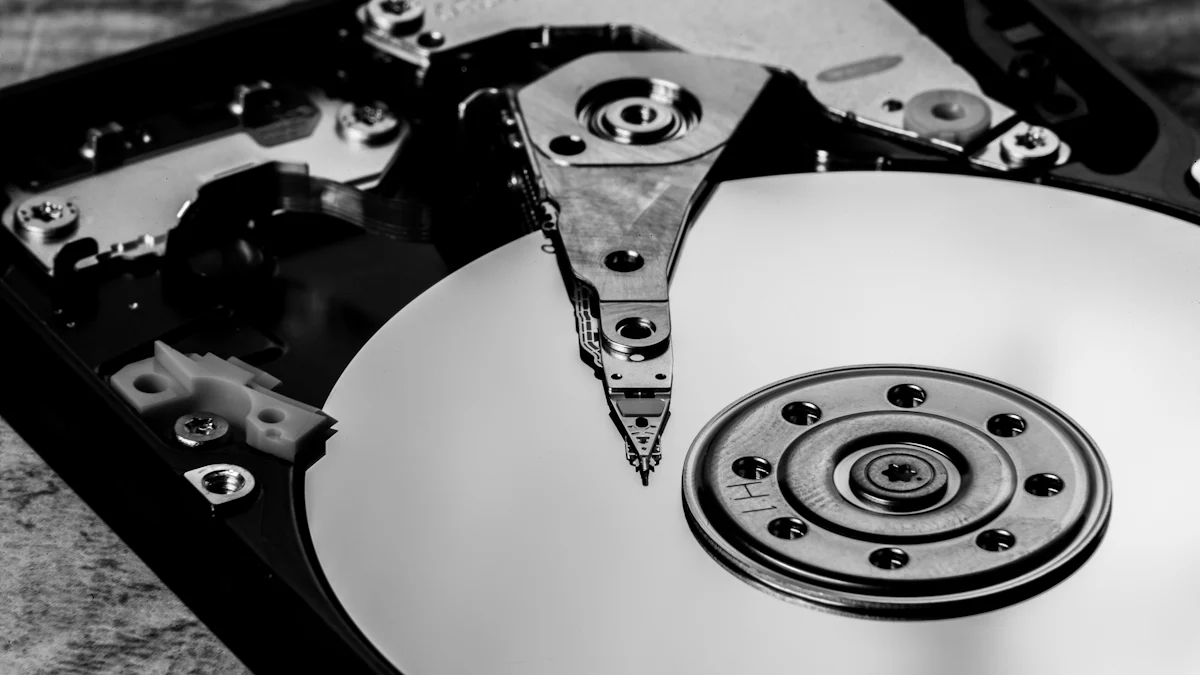


A Hybrid Hard Drive combines the best of both worlds. You get the large storage capacity of a traditional hard drive with the speed of a solid-state drive. This technology emerged to meet the growing demand for cost-efficient storage solutions. Hybrid drives have become popular because they offer speed, storage, and power conservation. Modern technology relies on these drives to boost performance and reduce noise. You’ll find them in many devices today, making your computing experience smoother and more efficient.
Understanding Hybrid Hard Drive

Components of a Hybrid Hard Drive
A Hybrid Hard Drive combines two types of storage technologies to deliver better performance and capacity. Let's break down the components.
Traditional HDD
The traditional hard disk drive (HDD) forms the backbone of a Hybrid Hard Drive. It uses spinning magnetic disks to store data. This component offers large storage capacity at a lower cost. Many users rely on HDDs for storing vast amounts of data, like photos, videos, and documents. The spinning disks in an HDD provide ample space but operate at slower speeds compared to SSDs.
Solid-State Drive (SSD)
The solid-state drive (SSD) is the speed booster in a Hybrid Hard Drive. It uses flash memory to store data, which allows for faster read and write speeds. SSDs have no moving parts, making them more durable and quicker than traditional HDDs. However, SSDs typically come with a higher price tag and offer less storage capacity. By combining an SSD with an HDD, a Hybrid Hard Drive leverages the speed of SSDs while maintaining the storage capacity of HDDs.
How Hybrid Hard Drives Work
Understanding how a Hybrid Hard Drive functions can help you appreciate its benefits.
Data Storage Mechanism
A Hybrid Hard Drive uses both the HDD and SSD components to store data efficiently. The drive automatically decides where to store data based on usage patterns. Frequently accessed files and applications often reside on the SSD portion. This setup ensures quick access and improved performance. Less frequently used data remains on the HDD, providing ample storage without sacrificing speed.
Performance Optimization
The Hybrid Hard Drive optimizes performance by using a caching algorithm. This algorithm identifies and stores the most commonly accessed data on the SSD. As a result, boot times and program launches become faster. Users experience a more responsive system without the high cost of a full SSD. The combination of SSD speed and HDD capacity makes Hybrid Hard Drives a smart choice for many computing needs.
Advantages of Hybrid Hard Drive
Enhanced Performance
Hybrid Hard Drives offer a noticeable boost in performance. You might wonder how this happens. The secret lies in the combination of SSD and HDD technologies. This blend provides an optimal balance between speed and storage capacity.
Faster Boot Times
Hybrid Hard Drives significantly reduce boot times. The SSD component stores frequently accessed system files. This setup allows your computer to start up quickly. You spend less time waiting and more time working or playing.
Improved Data Access
Data access speeds also improve with Hybrid Hard Drives. The SSD portion caches commonly used data. This means faster access to your favorite applications and files. You enjoy a smoother and more efficient computing experience.
Cost-Effectiveness
Cost is a significant factor when choosing storage solutions. Hybrid Hard Drives shine in this area. They provide a middle ground between traditional HDDs and SSDs.
Comparison with SSDs
SSDs offer incredible speed. However, the cost can be prohibitive for some users. Hybrid Hard Drives deliver similar performance at a lower price. You get the benefits of SSD speed without breaking the bank.
Long-term Savings
Hybrid Hard Drives also promise long-term savings. The initial investment might seem higher than traditional HDDs. However, the enhanced performance and reduced wear and tear lead to fewer replacements. Over time, you save money while enjoying superior performance.
Disadvantages of Hybrid Hard Drive
Hybrid Hard Drives offer many benefits, but they also come with some drawbacks. Understanding these limitations can help you make an informed decision.
Limited SSD Capacity
Hybrid Hard Drives combine SSD and HDD technologies. The SSD portion usually has limited capacity. This limitation can affect how you store and access data.
Storage Constraints
The SSD in a Hybrid Hard Drive often holds only a small amount of data. Users might face storage constraints when dealing with large files or applications. You may need to manage your data carefully to avoid running out of space on the SSD.
Impact on Performance
Limited SSD capacity can impact performance. When the SSD fills up, the drive may rely more on the slower HDD. This reliance can lead to slower data access times. Users might notice a decrease in speed when accessing less frequently used files.
Complexity in Data Management
Hybrid Hard Drives use a combination of technologies. Managing data on these drives can become complex. Users need to understand how the drive decides where to store data.
Data Caching Issues
Hybrid Hard Drives use caching algorithms to store frequently accessed data on the SSD. Sometimes, these algorithms may not work perfectly. Users might experience delays if the drive caches the wrong data. This issue can lead to frustration when trying to access important files quickly.
Maintenance Challenges
Maintaining a Hybrid Hard Drive can present challenges. Users need to ensure that both the SSD and HDD components function properly. Regular updates and checks can help maintain optimal performance. However, this maintenance requires time and effort from the user.
Applications of Hybrid Hard Drive
Personal Computing
Hybrid hard drives have become a popular choice for personal computing. Users enjoy the benefits of speed and storage capacity without breaking the bank.
Laptops
Laptops with hybrid hard drives offer a great balance of performance and portability. The SSD component speeds up boot times and application launches. Users experience quick access to files and programs. Large files and media can be stored on the HDD portion. This setup provides ample space for photos, videos, and documents. Users find laptops with hybrid drives ideal for everyday tasks and entertainment.
Desktops
Desktops equipped with hybrid hard drives deliver enhanced performance. The combination of SSD and HDD technologies boosts system responsiveness. Users notice faster load times for games and applications. Hybrid drives also reduce noise levels compared to traditional HDDs. This feature creates a quieter computing environment. Desktops with hybrid drives suit users who need both speed and storage for work or play.
Enterprise Solutions
Businesses benefit from hybrid hard drives in various ways. The drives offer cost-effective solutions for data management and storage needs.
Data Centers
Data centers rely on hybrid hard drives for efficient data processing. The drives provide fast access to frequently used data. This speed improves server response times and overall performance. Hybrid drives also offer large storage capacities. Businesses can store vast amounts of data without sacrificing speed. Data centers find hybrid drives essential for managing high volumes of information.
Cloud Storage
Cloud storage services use hybrid hard drives to enhance user experiences. The drives combine speed and capacity to handle large data sets. Users enjoy quick access to files and applications stored in the cloud. Hybrid drives also improve power efficiency. This feature reduces operational costs for cloud providers. Businesses and individuals benefit from reliable and fast cloud storage solutions.
Comparison with Other Storage Solutions of Hybrid Hard Drive

HDD vs. Hybrid Drives
Speed and Efficiency
Hybrid drives offer a unique blend of speed and efficiency. Traditional hard drives (HDDs) rely on spinning disks to read and write data. This method results in slower performance. Hybrid drives incorporate a small solid-state drive (SSD) cache. This cache stores frequently accessed data. Users experience faster boot times and quicker program launches. The SSD component in hybrid drives enhances overall system responsiveness. Hybrid drives provide a noticeable improvement over traditional HDDs.
Cost Analysis
Cost plays a crucial role when choosing storage solutions. Traditional HDDs offer large storage capacities at a lower price. Hybrid drives, however, strike a balance between cost and performance. Users get the benefits of SSD-like speed without the high price tag. Hybrid drives present a cost-effective option for those seeking improved performance. The combination of HDD storage and SSD speed makes hybrid drives an attractive choice. Users enjoy enhanced performance without breaking the bank.
SSD vs. Hybrid Drives
Performance Metrics
Solid-state drives (SSDs) deliver unmatched speed and performance. Hybrid drives, while not as fast as pure SSDs, still offer significant improvements. The SSD portion of a hybrid drive caches frequently used data. This caching leads to faster access times compared to traditional HDDs. Users notice quicker boot times and application launches. Hybrid drives provide a middle ground between HDDs and SSDs. The performance metrics of hybrid drives make them a viable option for many users.
Use Cases
Hybrid drives suit various use cases. Users who need both speed and storage capacity find hybrid drives ideal. Laptops and desktops benefit from the enhanced performance of hybrid drives. Users experience faster load times for games and applications. Hybrid drives also work well in enterprise environments. Data centers and cloud storage services utilize hybrid drives for efficient data management. The versatility of hybrid drives makes them suitable for diverse computing needs.
Future of Hybrid Hard Drive
Technological Advancements
Emerging Trends
Hybrid hard drives continue to evolve. New trends in technology shape the future of these drives. Manufacturers focus on improving speed and efficiency. The integration of advanced caching algorithms enhances data access. Users benefit from quicker load times and smoother performance. Hybrid drives adapt to changing user needs. The demand for faster and more reliable storage grows. Hybrid drives meet this demand with innovative solutions.
Innovations in Design
Design innovations play a crucial role in hybrid drive development. Engineers work on reducing the size of these drives. Smaller drives fit into more compact devices. Users enjoy the benefits of hybrid technology in portable gadgets. Enhanced durability becomes a priority. Hybrid drives withstand more wear and tear. The combination of SSD and HDD technologies offers greater resilience. Users experience longer-lasting storage solutions.
Market Predictions
Industry Growth
The hybrid hard drive market shows promising growth. Data analysts predict increased adoption rates. Businesses and consumers seek cost-effective storage options. Hybrid drives provide a balance between performance and price. The demand for efficient data management solutions rises. Hybrid drives offer an attractive choice for various applications. The industry sees continuous expansion as more users embrace hybrid technology.
Consumer Adoption
Consumer interest in hybrid hard drives grows steadily. Users appreciate the blend of speed and capacity. Hybrid drives cater to diverse computing needs. Personal and enterprise users find value in these drives. The affordability of hybrid drives attracts budget-conscious buyers. Users enjoy enhanced performance without high costs. The trend towards hybrid drive adoption continues to gain momentum.
Recommendations for Users of Hybrid Hard Drive
Choosing the Right Drive
Selecting a hybrid hard drive involves considering several factors. You want to ensure the drive meets your needs and enhances your computing experience.
Factors to Consider
First, look at the storage capacity. A larger capacity suits users with extensive data needs. Check the SSD portion size. A bigger SSD cache offers better speed for frequently accessed files. Also, consider the brand and model. Reputable brands often provide better reliability and support. Finally, think about the price. Balance your budget with the features you need.
User Needs Assessment
Assessing your needs helps in choosing the right drive. Identify how much data you store regularly. Consider the types of applications you use. Heavy applications benefit from a larger SSD cache. Think about your usage patterns. Frequent travelers might prefer drives with better durability. Evaluate your performance expectations. Faster boot times and quick access to files enhance productivity.
Maintenance Tips
Proper maintenance keeps your hybrid hard drive running smoothly. Regular care extends the lifespan and ensures optimal performance.
Best Practices
Start by keeping your drive clean. Dust and debris can affect performance. Use a soft cloth to wipe the exterior. Avoid exposing the drive to extreme temperatures. Heat can damage internal components. Regularly update your system software. Updates often include performance enhancements. Run disk checks periodically. These checks identify and fix potential issues early.
Troubleshooting Common Issues
Troubleshooting helps resolve common drive issues. If your drive slows down, check the SSD cache. A full cache might need clearing. Use disk cleanup tools to free up space. If you hear unusual noises, inspect the drive for physical damage. Backup your data immediately. For data access problems, verify connections. Loose cables can disrupt performance. Consult professional help for persistent issues. Experts can diagnose and fix complex problems efficiently.
User Testimonial: "Hybrid hard drives provide a balance between large storage capacity and improved performance. The drives offer faster responsiveness and boot times, making them a cost-effective solution for users desiring enhanced performance without sacrificing storage capacity."
Hybrid hard drives offer a unique blend of storage capacity and performance. The combination of HDD and SSD technologies provides a balance that suits various needs. You get faster boot times and improved data access without the high cost of SSDs. Hybrid drives serve as a cost-effective solution for users seeking both speed and ample storage. Future research could explore advancements in caching algorithms and design innovations. Consider hybrid drives if you need an affordable and efficient storage option.
FAQ
A hybrid hard drive combines the speed of solid-state storage with the capacity of traditional spinning drives. This blend offers enhanced performance and larger storage space.
Hybrid hard drives use a small solid-state drive (SSD) cache to store frequently accessed data. This setup speeds up boot times and application launches, providing faster responsiveness compared to traditional hard drives.
Hybrid hard drives offer improved reliability due to their SSD component. The lack of moving parts in the SSD reduces wear and tear, extending the overall lifespan of the drive.
Yes, hybrid hard drives consume less power than traditional hard drives. The SSD portion requires less energy, leading to longer battery life for laptops and reduced heat generation.
Hybrid hard drives suit gaming needs well. The faster data access speeds enhance game load times and overall performance, making them a cost-effective choice for gamers.
Laptops with hybrid hard drives benefit from quicker boot times and reduced operating noise. The combination of speed and capacity makes them ideal for users who need both performance and storage on the go.
Hybrid hard drives provide a middle ground between traditional HDDs and SSDs. They offer SSD-like speed at a lower price, making them an affordable option for users seeking improved performance without high costs.
Data management on hybrid hard drives involves understanding how the drive caches data. Users may need to monitor storage usage to ensure optimal performance, but the process remains straightforward with regular maintenance.
Continue Reading About Hybrid Hard Drive
2025 Best Data Integration Solutions and Selection Guide
Explore top data integration solutions for 2025, enhancing data management and operational efficiency with leading platforms like Fivetran and Talend.
Howard
Dec 19, 2024
2025's Best Data Validation Tools: Top 7 Picks
Explore the top 7 data validation tools of 2025, featuring key features, benefits, user experiences, and pricing to ensure accurate and reliable data.
Howard
Aug 09, 2024
Best Data Integration Platforms to Use in 2025
Explore the best data integration platforms for 2025, including cloud-based, on-premises, and hybrid solutions. Learn about key features, benefits, and top players.
Howard
Jun 20, 2024
Best Data Integration Vendors for Seamless Workflows
Discover the top 20 data integration vendors of 2025 for seamless workflows. Compare tools like Talend, AWS Glue, and Fivetran to optimize your data processes.
Howard
Jan 22, 2025
Best Data Management Tools of 2025
Explore the best data management tools of 2025, including FineDataLink, Talend, and Snowflake. Learn about their features, pros, cons, and ideal use cases.
Howard
Aug 04, 2024
Customer Data Integration: A Comprehensive Guide
Master customer data integration to enhance business operations by combining data from multiple sources for a comprehensive customer view.
Howard
Sep 07, 2024


